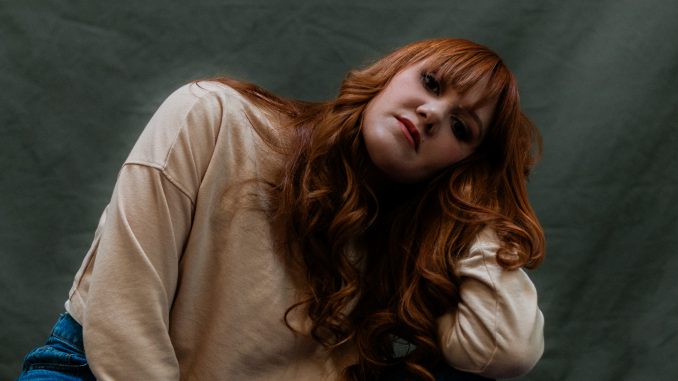
This Alabama-raised working woman is on a mission to create meaningful music.
Grace Pettis’ new album is “Down to the Letter,” released in June 2024 on MPress Records (CD, vinyl and digital). It has been three years since her previous album (“Working Woman”) came out, receiving plaudits for its forthrightness. Prior to signing on with the label, she recorded three indie albums and an EP. And with Rebecca Loebe and BettySoo, the trio side project Nobody’s Girl has recorded both an EP and LP. 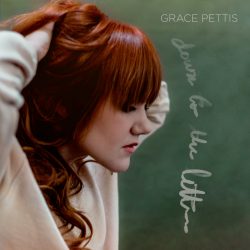 “Down to the Letter”uhas also been a cathartic release of the emotional confusion she was bound to express from experiencing the strife that is part of a divorce. Rather than being a victim, devastated, she chose to use that time wisely in healing wounds. “I’m still in recovery,” she said, reciting the AA trope. “My divorce was in 2022 and I survived it to become a better person than I was, and that’s an ongoing thing.” Little is left to the imagination in songs like ‘I Take Care of Me Now,’ one she calls her anti co-dependency song, moving past dysfunction. “I used to want to try to get you to come to my rescue, now I’ve learned to fight these dragons on my own.” As Neil Sedaka once expressed in his pop classic, breaking up is hard to do. Emotional scars are left that you only hope will fade with time, but it can also bring a sense of freedom. You can do what you want, be whoever you want to be, no longer held back trying to suture a wound too deep. As in a Joss Stone song, Pettis was bruised but not broken, and finally ready to make some passionate music. ‘Sobering Up’ is an emotional ballad about realizing things aren’t working and being unsure of what to do about it. “Without the shape and the weight of you in my bed, I couldn’t sleep last night. It’s a drug. I’m going through withdrawal. Sobering up like you, when all I really want Is to be loved.” It’s nothing AA can remedy because the withdrawal from a relationship is metaphorical. The album version is deeply affecting but you should also check out the YouTube video (below) of her playing the song solo acoustic from McGonigel’s Mucky Duck in Houston.
“Down to the Letter”uhas also been a cathartic release of the emotional confusion she was bound to express from experiencing the strife that is part of a divorce. Rather than being a victim, devastated, she chose to use that time wisely in healing wounds. “I’m still in recovery,” she said, reciting the AA trope. “My divorce was in 2022 and I survived it to become a better person than I was, and that’s an ongoing thing.” Little is left to the imagination in songs like ‘I Take Care of Me Now,’ one she calls her anti co-dependency song, moving past dysfunction. “I used to want to try to get you to come to my rescue, now I’ve learned to fight these dragons on my own.” As Neil Sedaka once expressed in his pop classic, breaking up is hard to do. Emotional scars are left that you only hope will fade with time, but it can also bring a sense of freedom. You can do what you want, be whoever you want to be, no longer held back trying to suture a wound too deep. As in a Joss Stone song, Pettis was bruised but not broken, and finally ready to make some passionate music. ‘Sobering Up’ is an emotional ballad about realizing things aren’t working and being unsure of what to do about it. “Without the shape and the weight of you in my bed, I couldn’t sleep last night. It’s a drug. I’m going through withdrawal. Sobering up like you, when all I really want Is to be loved.” It’s nothing AA can remedy because the withdrawal from a relationship is metaphorical. The album version is deeply affecting but you should also check out the YouTube video (below) of her playing the song solo acoustic from McGonigel’s Mucky Duck in Houston.
Well, it’s time to let Grace do the talking. You’ll learn about other songs such as ‘Paper Boat,’ a coming-of-age ballad remembered from a dream she had of being at a Shawnee Kilgore show with paper boats hanging by strings from the ceiling. And on ‘Landon,’ from her new record, backed by The Indigo Girls, she regrettably lets down a childhood friend.
If someone were to ask you what the music you play is like, your answer would be ….
I grew up in Georgia and Alabama and spent my formative musical years in Texas. My music is southern but there are parts from all those places. As a songwriter, I’m not trying to accomplish anything except write about life from my vantage point in the context of the world at large.
Were they small towns?
Yes. My dad and grandparents lived in a little Alabama town called Fort Payne. Then he moved to the tiny town of Mentone on Lookout Mountain, which is near Fort Payne in the valley. That’s where I went to high school. In the ‘50s and ‘60s, my grandparents were well known in the community. They owned a Western Auto store, went to the Methodist church, and did a lot in the community. Before high school, I lived with my mom for a while in Decatur, Georgia, and visited my dad on the weekends and summers. My dad’s place was where I felt roots the most. I came into town like a stranger but with context because they knew all about those crazy Pettises on the mountain.
Was Eddie’s Attic in Decatur active when you were living there?
Yes, and my family used to play a Christmas show there every year. My dad Pierce Pettis was a working musician and my brothers Rayvon and George are both musicians.
Who did you listen to while growing up, besides your dad, of course?
My parents listened to a lot of folk music like Joni Mitchell and Bob Dylan and, of course, The Beatles. I was always around a lot of local writers and players. My dad would come home from touring with a box of CDs that he swapped out for his own CDs. So, the catalogue I had was like a ‘90s folk deejay. For a time, I was really into a lot of jazz and R&B. I loved Billie Holiday, Lauryn Hill, Beyoncé, TLC, and I was into soul like Aretha Franklin, female voices that were individual.
How about your dad’s music?
He was kind of Southern folk rock. He started out as a teenager working at Muscle Shoals. For a while, he was part of the fast folk movement in New York.
I hadn’t listened to your music until lately, but I’m impressed by the depth of your songs. Some of it must be in the genes or just soaking up the music around home. How did you hone your writing skills?
When I was a kid I started writing songs, hundreds and hundreds of them. I wasn’t educated for it, but I’ve been around songwriters all my life, and if you’re listening you pick up stuff. Every time you write a song it gets a little bit better than the last one, so it’s quantity in my case not training.
What are you trying to create when writing a song?
I write a lot to make meaning out of my experience. Sometimes that means processing something difficult, and other times it’s writing something that I want to be true, that I can step into almost like a mantra. It’s like an act of faith, something you want to believe about yourself, the world or other people. Putting it on paper and turning it into music is a way to manifest it. It almost feels like a magic trick to alchemize pain and suffering and turn it into art. Sometimes I’ll write a song and I don’t even know what it’s about until years later when I realize that it was something I needed to hear.
One of the songs on the new record is ‘Horses.’ Have you had any personal experience with horses?
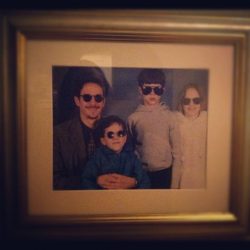
I took riding lessons for a while, but I was just obsessed with horses. I had a lot of horse dolls; I was constantly drawing them. I read books about them, of course, “Black Beauty” and “National Velvet.” Why I didn’t ride much is because I had this childhood disease called Juvenile Idiopathic Arthritis. There were years of chronic pain, and I couldn’t do a lot of physical things. I had to do indoor activities like drawing, writing and playing music.
So did this arthritis finally clear up?
It’s a really mysterious auto-immune disease that primarily affects girls. It’s like a coin flip. Half of the girls have it their whole lives, and it goes away for the other half. I happened to be on the lucky side of the coin.
A woman’s place in the world is a recurring theme in your music.
Well, being a person that has a uterus, it’s a big part of my experience. We write about what we know, who we are and where we are in society. If you write about being a mother or being in love as a heterosexual woman with a heterosexual man, you’re talking about what it is to be a woman. So, it’s not so much a political agenda, but our entire experience has been politicized. If I write about my experience, I’ll likely touch on something that’s been in the news.
One issue that’s been in the news, usually when a trans woman easily wins an event competing against women. That happened in a swimming competition not long ago, and it became yet another topic the media used to divide Americans. Do you have an opinion on trans women competing in women’s sports?
My identity as a straight woman is not threatened by anybody else’s, nor am I afraid of what someone else’s definition of being a woman is. The right way is to be the woman you want to be, and for me, that’s a straight woman from the South. I have trans women friends, and it’s a difficult time for them in this country just because your identity, who you are as a woman has become a political football. Just your existence is a threat to people. So, things like calculating where to use the bathroom or getting fired from your job or if you can live in a certain neighbourhood, these are what my friends have to deal with every day. And I think it’s insane, the climate we live in, treating people’s lives as fair game for political gain. It’s not about being an activist. It’s doing what we all want to do: live safely, have a family and a job. As for athletes, you know, culture catches up. Whenever we have a new phenomenon, like when women were allowed to divorce for the first time, we had to come up with a new term for that and it’s “Ms.” It took a while but we figured it out. It’s the same when there’s a new technology. What do you say when you answer a phone? At first, we didn’t know. There’s an awareness that hasn’t been there before of a community of folks who have been with us forever, and society is trying to catch up with the rules. So, what do we do about sports? What do we do about pronouns? As for me, I just err on the side of letting people be who they are and learn how to love our neighbours. Other people’s existence doesn’t threaten mine. Civil rights is not a zero-sum game, so if we give some to some people it doesn’t mean I get less. We need to stop thinking about things that way.
That’s an interesting perspective, one I hadn’t thought of before.
Actually, the real problems women face today come from passing laws that are killing us, like when we have pregnancies that are ectopic. There are actual threats to women in America today. I don’t want to spend time fracturing a community of women by saying I’m more of a woman than someone else. I don’t have the time or patience for that because we have actual work to do. We need to fight for paid leave, combat infant mortality, of which the rate is the highest in the developed world. It’s just politicians wanting power. Frankly, it pisses me off.
‘Landon’ is a striking song from your “Working Woman” album. Is that a portrait of someone you know or a composite?
No, that’s autobiographical. It’s about a friend of mine, Landon Beatty, a person I went to high school with who’s gay. He came out after we graduated, which was calculated because he was going to school in North Carolina and felt safe enough to make those phone calls. I was one of those folks to get a call, and at the time I was not equipped to handle that conversation. In that moment, I wasn’t a good friend, and I spent a lot of years regretting not letting him tell me who he was. Anytime someone has the courage to show up with vulnerability and honesty wanting to tell you, at the core of me this is who I am, the only correct answer is, thank you for trusting me with this information about yourself. I hear you, I see you and I love you. It’s simple starting there, but with all the bullshit I believed, that had been fed to me, I wasn’t able to respond in a simple way.
You do have to forgive yourself eventually rather than live with regrets.
Of course. I was seventeen, an age when we all do dumb stuff. That’s why I wrote this song, as an apology to him expressed in a way he could hear it. It worked and we got to be friends again. I was playing it often at shows, and he loved the song. He did the choreography for the video, and he’s actually in it, dancing and acting. Of all my songs, this has been the one I am most proud of because it seems to do good work out in the world. It starts conversations between people who haven’t been talking to each other. It helps parents and grandparents find out how to talk to their non-binary child. I feel the song is more important than ever, so it’s still in heavy rotation in my sets. Landon and I want to help the next generation and the generation after that have an easier time than he had, so that when kids come out to their parents and friends they’re met with love and respect for the courage that takes and not with fear that they won’t be understood.
That reminds me of a friend from the inner city that I lost track of because he didn’t fit in with my classmates in a suburban high school. They pegged him as a loser who wasn’t going on to college. Fifty years later I happened to see a picture of him on Facebook. He had recently died and I learned he became a chef, which he used to talk about often. That was embarrassing to think I let someone who I’d hung out with, sung Temptations songs on the street corner with, slip out of my life because he didn’t look or speak like kids at my school. Going your separate ways after graduation is one thing; happens all the time as we start the transition from teenager to adult. But, as you said, we all do dumb stuff, some of it unwittingly thoughtless to what effect it may have on someone else.
I feel that the friendships we make at 15 or 16, those are some of the strongest bonds in our lives. We’re just not that honest with people very long. We get older and put on masks. There’s something special about those friends, and we really should hang onto them. This sounds a little like your high school experience, but me and all my high school friends have grown in radically different ways and are across very diverse social strata. Maybe they’re the kind of people that if I ran into them in a coffee shop, we wouldn’t be friends because I’m this and you’re that. But because we remained friends, we are still able to connect even if we end up in different places in life. Grown-ups could all get better at that. You know, kids don’t care. They don’t care how much your parents make, what colour you are, whether you like little boys or girls, everybody’s just friends. As adults, we get really tribal.
Another song from that album, ‘Paper Boat,’ has a sense of desperation. Before you think “Are you kidding me?” what can you say about that song?
Well, I dreamed that song, woke up and wrote it down. It’s a song about being a girl and becoming a woman in the world, a coming-of-age song. The paper boat felt right because on one hand, it’s something that floats, right, that’s able to navigate the currents. On the other hand, it’s made out of paper and represents in a way feeling like you’re set up to fail. You’re vulnerable, like if you weigh less than most of the population. It has a sense of being fragile. As a kid, it feels different, like everyone’s the same, but then at some point, you become a girl. You start wearing bras and notice how people look at you, and you have to be aware of your surroundings because you’re kind of prey. There are risks, of rape, physical violence, not being paid what you’re worth. You have to walk the world in a different way, and that transition is difficult. And then there’s another tough transition, from being a girl to a woman. That’s what the song is about, feeling vulnerable in that sense, recognizing you are sort of at the mercy of the first college boyfriend. Is he a nice guy? You don’t really know what’s going to happen, say if you go to a party. We all make these monumental choices when we are young, and we’re at the mercy of their outcome.
On “Down to the Letter,” which song would you say represents best your vision of the album?
I feel that I’ve said exactly what I wanted to in ‘Vivian.’ It’s something I’m proud of having said. I felt an affinity to Johnny Cash’s first wife when I was going through separation and divorce. I read her autobiography and her memoir and wrote her a song. It’s a good song. I felt that any song you write about the Cash family has to live up to a certain standard. You think about what a wonderful writer Rosanne Cash is and do a lot of re-writes. As a result, I think it’s a better-crafted song.
All of her music is great, but I always seem to come back to “Seven Year Ache.”
Yeah, no doubt, I love that song.
When you’re not writing or recording or playing out, who do you listen to just because you want to hear some music?
I listen to my friends’ music. Now that I’m living in Nashville, I know so many amazing songwriters and musicians. Like, they’ll take your order at a fast-food place or whatever. Everyone there has talent. I’m into the folk/Americana music, like Kathleen Edwards. I was listening to her record yesterday, must have listened to it a thousand times. Anais Mitchell. I’m on a Maggie Rogers kick right now, then Katie Pruitt, Kyshona has a new record out. My boyfriend Robby Hecht has a new record that is really good. I love Allison Russell. Megan Burtt has a new record. She’s one of my favourite co-writers.
Can you see yourself like, say, the Rolling Stones who just keep on keeping on?
Yeah, I want to be like Willie Nelson making music until the wheels fall off. That’s the dream, having a career that supports and accommodates you in a way that allows you to be touring into your seventies and eighties. Right now, I carry my own gear, do all my own merch, and it’s a very demanding job. Yesterday, I drove eight hours. I wish I had enough help because the older I get, it gets harder and harder, especially if you factor in having a family.
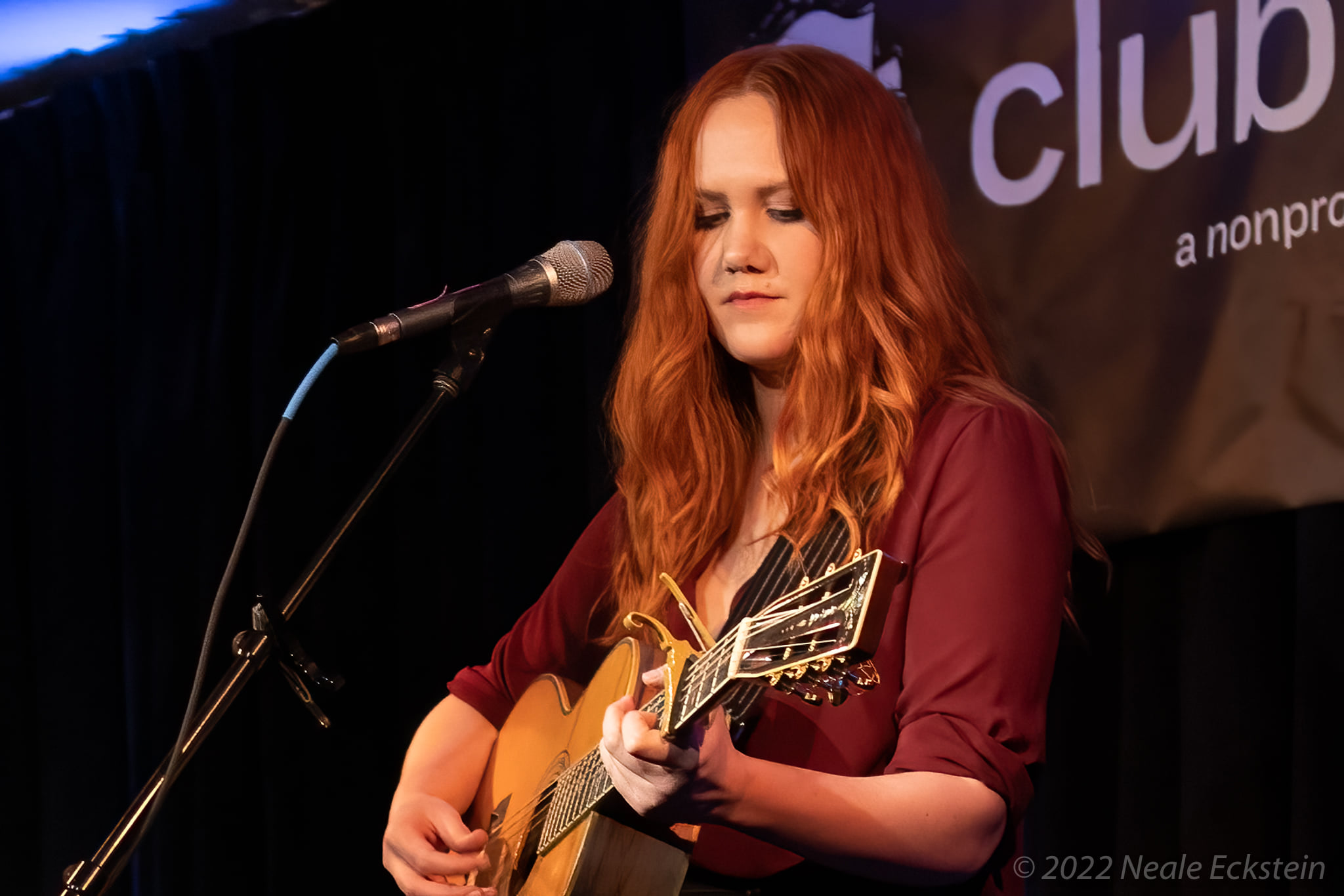
I see you’re playing solo gigs now or with Robbie.
That’s right. I do have bands in Texas and Nashville that I play with when I can afford it when there’s a gig that pays enough. I would love to be in a band, putting some good players on the road and letting them live out their dreams.
Are there any musicians in particular who have been with you consistently?
Yes, my friend Calloway Ritch. We played together for eight years in Texas before I moved to Nashville and got divorced. He’s still my guitar player when I’m in town but has a bunch of other stuff going on. My guitar player in Nashville is Lulu Jones, who is fantastic.
What about Nobody’s Girl? Is that band still together?
Nobody’s Girl is the band I’m in with Rebecca Loebe and BettySoo. It’s kind of dormant now, but I’d love to get together with them again. We write all the songs together and trade off being lead singer. It’s like a travelling sleepover. It’s the best.
That music is different from yours.
It’s kind of a pop folk, I guess, where mine tends to be grittier on the Americana line. Nobody’s Girl is poppier and fun, not that it doesn’t have substance, it’s just shinier packaging with sequins and a big full band.
What have you found different being on the label as opposed to indie?
The label has been wonderful. I have a kind of unicorn situation because it’s a small boutique label with just a few artists that they are really passionate about. There’s a healthy budget for recording and publicity, distribution and radio, which very few labels these days can say. They’ve been doing it for two decades, so it’s a well-functioning system. The newer labels have to figure it out for a few years. With MPress, they like being small, not taking on a ton of artists, though if one blows up they’ll scale up accordingly. Talking with friends on other labels, I know how lucky I am. Their goal and mine is to make really good art and hope to figure out a way to monetize it, rather than not trying to monetize it and maybe we’ll make art along the way.
So, there isn’t pressure and there is, and that’s the pressure you apply to yourself through your craft. The philosopher Thomas Carlyle wrote, “No pressure, no diamond.”
The pressure is to do something worthy of the opportunity I have. All these people are invested in me with their time, money and effort. It’s a gift that a lot of artists never receive, to have an actual budget to make a record the way I want. Others are bartering and selling heirlooms just to cobble together enough to pay for studio time. The pressure isn’t coming from the people at the label; it’s internal to live up to the faith they have in me.
Besides that, some don’t even have support from their families. As one musician from Britain told me: His father owned a pizza shop and wanted his son to learn the business and eventually take over when he retired. He had to go off to London on his own without anything but a guitar and a little money in his pocket in order to follow his dream. Do you think it was easier, coming from a family that was very involved in making music? At least you had support and some idea of what you were getting into.
I was lucky that both of my parents are in the word business. My dad has been a working songwriter for decades, and my mom is an English professor. I’m very grateful that both understand the value of good writing, even if it’s not making money.
That’s not to say they both didn’t want me to do something else because they did. But it was only out of a desire for me to have medical insurance.
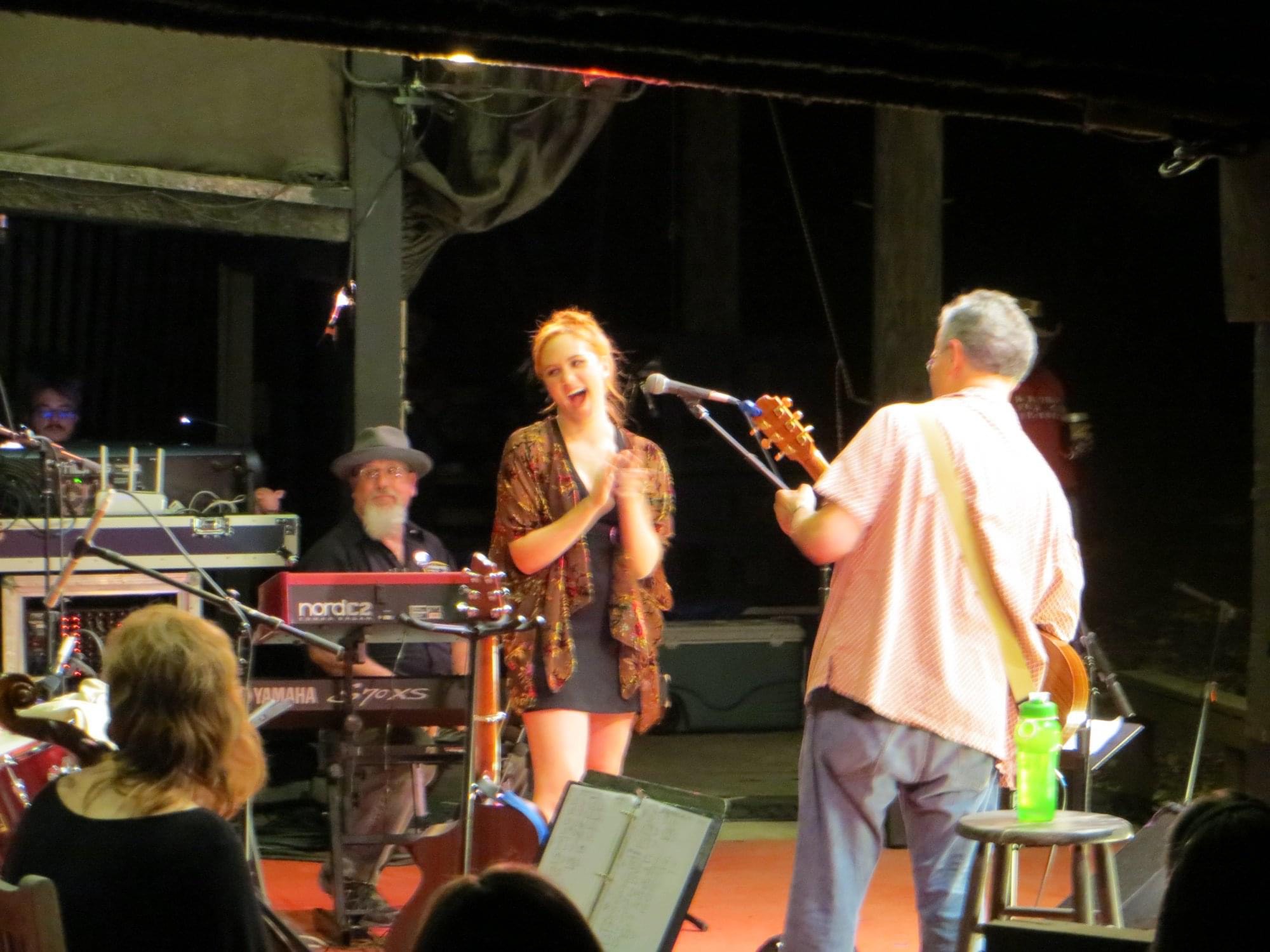
Even with family support, starting out to be a musician must be pretty hard. Why not do something else?
It’s hard all the way through. But, yeah, get a day job and pay the bills. Get a degree. Do the practical thing. My mother watched my dad struggle for years, and they wanted their kids to have some stability in life. It’s not a smart business plan. And I was one of those kids that got good grades and could have done a lot of different things. They both were terrified and rightly so when I was nineteen and wanted to do this.
Was there ever a point where you thought maybe I should try something different? This isn’t happening.
Oh, yeah. I’ve had a lot of day jobs and will continue to have jobs. You don’t have to be a full-time musician to be legit. As I get older, though, I probably will structure my art in another way. We just do it in a way that makes sense for where we are at the moment.
If you weren’t a musician, what do you think you would do?
I’d be a truck driver. Because I like long drives listening to audiobooks for hours, and nobody’s watching so you can eat a lot of fast food. But the older I get it’s harder on my body. I once thought about being a therapist, like a middle school counsellor. But I didn’t want to be in one place every day. The nice thing now is you can do telehealth, which I’m still considering, though not to replace music but as a supplement.
Do you have any goals with your music, anything in particular you’d want to accomplish at some point in your career?
I want to make good music, for sure. If I can pay my bills and do as little kind of other work as possible, that would be great. I want to hang onto my identity outside of music, not lose myself in it so I forget about other interests, hobbies and having a family. I want to be respected by other songwriters, create work that has integrity. Those goals are important because I love my team, my manager, my agent, my label, my producer, all the musicians I work with. It would be great to create more opportunity within my community. For that reason, I’m motivated to play better shows, sell more records, make more money and chart. One of the songs on “Working Woman” is actually about all this. I want my work to be good, want it to mean something. That’s the song, by the way, ‘Mean Something.’ When things aren’t going my way, obstacles to overcome, I’ll sing that song and remember why I’m doing this. Because I’m a musician’s daughter, I’ve seen the way the Ferris Wheel goes up and then comes down. It’s all cyclical, seasonal. For a lot of my peers, when we start out, we think it’s going to be an upward-moving slope. Maybe it is but at some point, it’s going to come down. So, my motivation has to be more than getting to the top of some imaginary slope because once you do, there’s another one and another one, like a receding horizon line. There’s always another goal to reach if you’re just focused on money, career and fame. You can never be fully satisfied with those things. If you want to be a lifer, there has to be something else and for me, that’s doing really good work that is useful in healing the world, healing people and healing myself. Just a good use of my finite time on the planet, making good art that I can leave behind.
Nobody escapes life’s ups and downs and just exists on one trajectory or the other. Pettis’ fortunes trended upward as she wrote and recorded “Down to the Letter.” It purged some of the pain that comes from ending a marriage. Recently she found out that her trajectory was still heading upward.
Since the time of this interview, Grace Pettis received some exciting news. She has been accepted for a 12-week residency from the Helen Wurlitzer Foundation, located in Taos, New Mexico. She will be writing songs from an artist casita alongside other artists of various disciplines. The foundation’s mission is to “support the artist and the creative process.” The residency is the second oldest in the United States and is located on 15 acres in the heart of Taos. As Pettis said, “I feel honoured to be in the company of its alumni. No rent, no utilities, no deadlines, no quotas. I don’t know anything about New Mexico but my next album is likely going to be about it.”
If the three months she spends in residency turn out to be as good as it appears, I can hardly wait to hear her New Mexico album.


